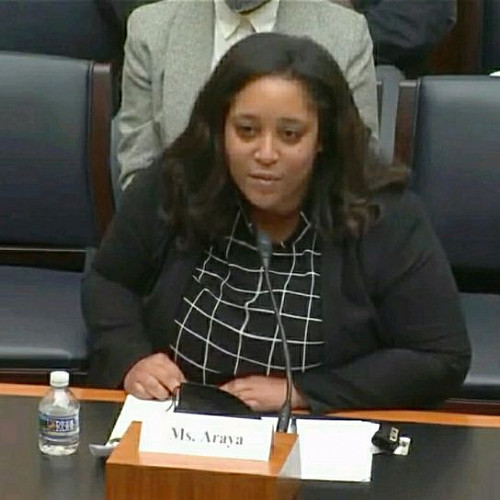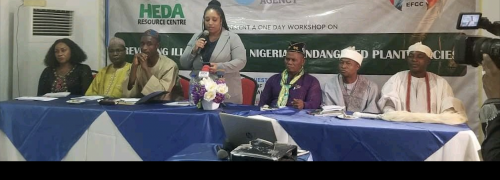Strategizing Climate Change Policy and Natural Resource Governance Solutions in Africa
Kidan Araya’13 lives a life of purpose as an advocate in the U.S. and abroad for communities harmed by environmental crime. Her Beloit education helped prepare her.
When Kidan Araya’13 was looking at college options, she sought an education that would prepare her to work for positive change in the world.
Her criteria included an international focus, experiential learning and study abroad, and a curriculum that would allow her to study the complex questions that interested her. Financial aid to support her educational goals would also be necessary.
“The decision to attend Beloit College proved right for me,” she shares. “I was able to double-major in international relations and environmental studies, and had the financial support to both study abroad and do independent research.”
Her motivations to effect change were personal: “I’m from Sacramento, one of the most diverse cities in the U.S., and my dad is from Ethiopia,” she says. “I have been rooted in different cultures all my life. From childhood on, I have also been aware that marginalized communities are often saddled with policies that disadvantage them, but have neither the resources nor power to change those policies.”
Determined to do something about that, she chose Beloit College to gain the knowledge and experience she’d need.
Thus, summer funding available through Beloit College enabled Kidan to study urban agriculture in the U.S., including in Boston. Next, financial aid from Beloit and a Gilman Scholarship supported a study abroad semester in Cameroon. Then, a research grant from the Weissberg human rights program allowed her to spend a summer in Cameroon’s Congo Basin rain forest, where she gained insight into indigenous communities’ management of their natural resources.
Today, Kidan credits Beloit with preparing her to become both an expert on environmental crime in Africa and an organizer and advocate. Indeed, her expertise and insights are sought after.

In June 2021, at the request of the Department of State, she had spoken at the U.S. Embassy in Banjul, The Gambia, Africa’s smallest nation. Alongside the ambassador, she and stakeholders in The Gambia discussed the illegal trade in rosewood timber, its repercussions for Gambians’ lives, and trade and climate finance solutions.
Based in Washington, D.C., Kidan works by day in climate finance at a global philanthropy, where she is involved in strategic grant-making and sustainable impact investing to seed innovation in climate solutions.
After hours, she networks, organizes, and communicates with fellow Africa policy professionals and climate security peers to bring attention to the world’s most pressing environmental and natural resource governance challenges and to advocate for solutions to them. In addition to The Gambia, her expertise and advocacy have taken her to countries such as Nigeria and the Democratic Republic of Congo to work alongside communities, government officials, and civil society.
Although Kidan had never left the U.S. before she studied abroad in Cameroon, she was prepared. She had studied Cameroon’s political ecology and environmental governance for an assignment in an international relations course taught by political scientist Pablo Toral, one of her key advisors at Beloit. And in an environmental studies course, she had undertaken a small group advocacy project. These experiences helped teach her how to both develop winning advocacy strategies and to work with others to create change.
Kidan was also developing public speaking and research skills. As a McNair Scholar, she presented her research findings weekly to the other scholars and their advisors, then answered questions, often hard, about her research in real time. Additionally, as a participant in a Beloit College symposium, she shared her research on sustainable development and environmental justice in New Orleans.
At the same time, Kidan was honing her ability to engage with high-level
Kidan’s expertise and skills have not gone unnoticed. She currently serves as a Board Member for the African Policy Accelerator. Housed at the Center for Strategic and International Studies, it is one of the world’s top think tanks. She was also named one of 14 2021-22 Climate Security Fellows at the Center for Climate and Security, an honor reserved for rising leaders and emerging experts in those areas.
“As a Black woman working in predominantly White spaces in the environmental and foreign policy fields, I’m compelled to emphasize solutions that work for communities of color,” she says of her involvement.
She notes that the benefits of a Beloit College are not universal. While studying for a master’s degree in geography at the University of Washington, for example, she noticed that unlike her, other students were reluctant to approach guest speakers after their talks. Practice doing so had not been part of their undergraduate experience.
Kidan’s advice for current and future Beloit College students? “Take advantage of opportunities to study abroad in countries typically underrepresented in study abroad and to do your own field research. Be active in classes, forge strong connections with your professors and classmates, and challenge yourself by taking classes outside your major.”
For Kidan, the latter included taking the course Music in Cold Places as a senior, where she learned about indigenous Sami people and their challenges with food sovereignty and climate change. This knowledge would help her win a U.S. Department of Education Foreign Language and Area Studies grant to study language and food insecurity among African diaspora communities in Sweden.
What’s next for Kidan? She plans to continue organizing with people across government, philanthropy, and communities to create positive change. After all, she’s found her passions: Connecting bright ideas in under served communities with financing, and advocating for global policy solutions to climate change and sustainable development.



